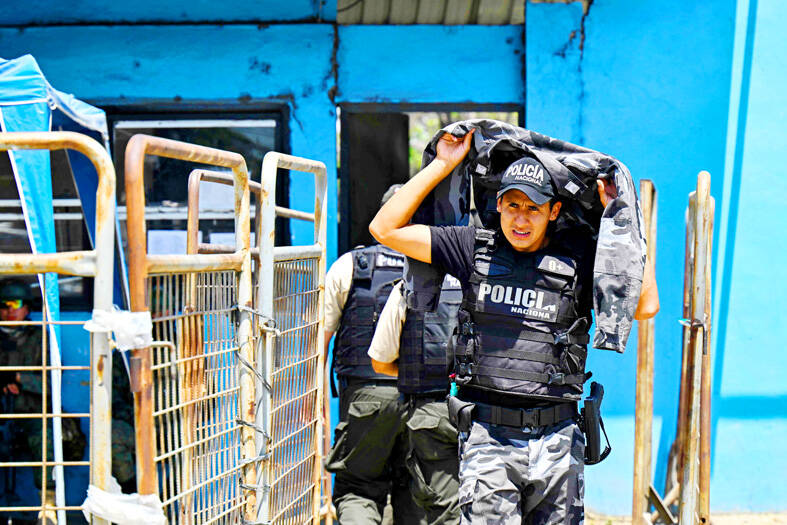Two uniformed agents cower behind a wall, gun at the ready, fearfully eyeing a vehicle parked outside their police station after nightfall in the violence-stricken Ecuadoran port city of Guayaquil.
Any vehicle near a police station in these parts is viewed with suspicion after a recent spate of gun and explosives attacks blamed on a gruesome gang war that has killed dozens of officers since last year.
Numerous attacks this week in the city of 2.8 million people have killed five police officers and a civilian, and injured at least 17 members of the security forces.

Photo: AFP
Officials say the attacks were a response by organized crime to an ongoing mass transfer of inmates from the infamous Guayas 1 prison in Guayaquil to other jails controlled by different gangs.
On Friday, special police units oversaw the transfer of gang leaders even as journalists and concerned family members who were gathered outside could hear loud detonations coming from the jail.
Even police live in fear in Guayaquil where gangs outgun law enforcement and everything from the port to the prisons are under criminal control.
So far this year, the commercial heart of Ecuador has seen 1,200 murders — 60 percent more than last year, official data showed.
“I’ve seen bombs explode,” said a Guayaquil petrol attendant who did not want to be named for fear of retribution.
“That’s the danger right now. You have to watch out for any motorcyclist: If they leave something behind or throw something ... you have to watch out,” he said.
Ecuador — once a relatively peaceful neighbor of major cocaine producers Colombia and Peru — has seen a wave of violent crime that authorities blame on turf battles between rival gangs with ties to Mexican cartels.
Ecuadoran President Guillermo Lasso responded to this week’s rash of attacks by declaring a state of emergency and nighttime curfew in the Guayas and Esmeraldas provinces, which was extended on Friday to include Santa Domingo de los Tsachilas.
He also ordered the deployment of troops to the three provinces, home to one-third of Ecuador’s 18 million inhabitants.
The streets of Guayaquil, worst hit by the violence, are largely empty at night, and police are on high alert.
They patrol in vans with the lights turned off or barricade themselves at their command posts wearing bulletproof vests.
Streets near politicians’ homes are fenced off to any traffic and petrol attendants hold their posts in fear after a number were targeted in the most recent fear-mongering campaign.
It has become an occupation of “life or death,” said one attendant, 21, who did not want to be named and said he feared being shot dead by “merciless” criminals.
Lasso has vowed his government will “not surrender to narco-terrorists.”

Thousands gathered across New Zealand yesterday to celebrate the signing of the country’s founding document and some called for an end to government policies that critics say erode the rights promised to the indigenous Maori population. As the sun rose on the dawn service at Waitangi where the Treaty of Waitangi was first signed between the British Crown and Maori chiefs in 1840, some community leaders called on the government to honor promises made 185 years ago. The call was repeated at peaceful rallies that drew several hundred people later in the day. “This government is attacking tangata whenua [indigenous people] on all

RIGHTS FEARS: A protester said Beijing would use the embassy to catch and send Hong Kongers to China, while a lawmaker said Chinese agents had threatened Britons Hundreds of demonstrators on Saturday protested at a site earmarked for Beijing’s controversial new embassy in London over human rights and security concerns. The new embassy — if approved by the British government — would be the “biggest Chinese embassy in Europe,” one lawmaker said earlier. Protester Iona Boswell, a 40-year-old social worker, said there was “no need for a mega embassy here” and that she believed it would be used to facilitate the “harassment of dissidents.” China has for several years been trying to relocate its embassy, currently in the British capital’s upmarket Marylebone district, to the sprawling historic site in the

‘IMPOSSIBLE’: The authors of the study, which was published in an environment journal, said that the findings appeared grim, but that honesty is necessary for change Holding long-term global warming to 2°C — the fallback target of the Paris climate accord — is now “impossible,” according to a new analysis published by leading scientists. Led by renowned climatologist James Hansen, the paper appears in the journal Environment: Science and Policy for Sustainable Development and concludes that Earth’s climate is more sensitive to rising greenhouse gas emissions than previously thought. Compounding the crisis, Hansen and colleagues argued, is a recent decline in sunlight-blocking aerosol pollution from the shipping industry, which had been mitigating some of the warming. An ambitious climate change scenario outlined by the UN’s climate

BACK TO BATTLE: North Korean soldiers have returned to the front lines in Russia’s Kursk region after earlier reports that Moscow had withdrawn them following heavy losses Ukrainian President Volodymyr Zelenskiy on Friday pored over a once-classified map of vast deposits of rare earths and other critical minerals as part of a push to appeal to US President Donald Trump’s penchant for a deal. The US president, whose administration is pressing for a rapid end to Ukraine’s war with Russia, on Monday said he wanted Ukraine to supply the US with rare earths and other minerals in return for financially supporting its war effort. “If we are talking about a deal, then let’s do a deal, we are only for it,” Zelenskiy said, emphasizing Ukraine’s need for security guarantees